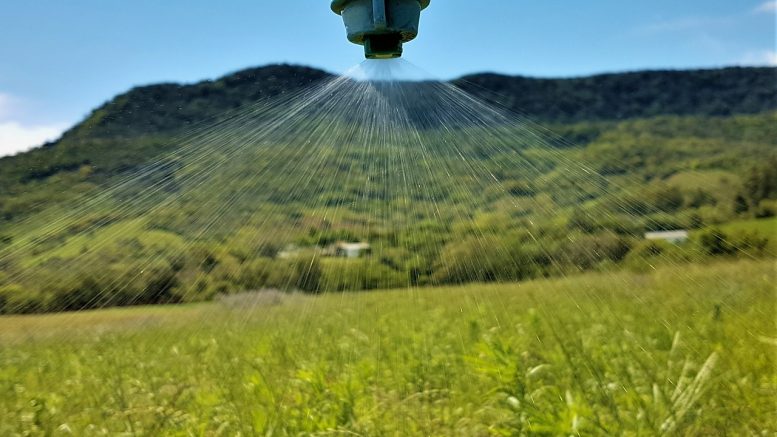“Adjuvantes agrícolas são substâncias adicionadas às formulações de pesticidas ou aplicadas em conjunto com eles para melhorar sua eficácia…”
Leandro Viegas é CEO da Sell Agro, empresa especializada em tecnologia de aplicação e adjuvantes agrícolas, formado em administração de empresas e direito.

Leandro Viegas, CEO da Sell Agro
AgriBrasilis – Quais são os diferentes tipos de adjuvantes e para que são utilizados?
Leandro Viegas – Adjuvantes agrícolas são substâncias adicionadas às formulações de pesticidas ou aplicadas em conjunto com eles para melhorar sua eficácia. Existem vários tipos de adjuvantes, cada um com uma função específica:
| Surfactantes (ou tensoativos) – Reduzem a tensão superficial entre o líquido e a superfície da planta, melhorando a cobertura e a penetração do pesticida; |
| Umectantes – Mantêm a superfície tratada úmida por mais tempo, retardando a evaporação da solução aplicada; |
| Dispersantes – Mantêm partículas sólidas suspensas na solução líquida, evitando a sedimentação; |
| Agentes de compatibilidade – Permitem a mistura de diferentes produtos químicos na mesma solução sem causar reações indesejáveis; |
| Penetrantes – Aumentam a absorção do pesticida através das cutículas das plantas; |
| Adesivos – Ajudam a manter o pesticida na superfície das folhas, mesmo após chuva ou irrigação; |
| Antiespumantes – Reduzem ou eliminam a formação de espuma durante a mistura e aplicação dos pesticidas; |
| Ajustadores de pH – Ajustam o pH da solução para otimizar a estabilidade e a eficácia do pesticida; |
| Antievaporantes – Reduzem a evaporação dos pesticidas, especialmente sob altas temperaturas; |
| Corretivos de água – Neutralizam os íons presentes na água que podem reduzir a eficácia dos pesticidas. |
Toda essa linha de adjuvantes é produzida pela Sell Agro e são essenciais para garantir que pesticidas sejam aplicados de maneira eficiente, maximizando sua eficácia e minimizando o impacto ambiental e econômico.
“Tecnologias avançadas de aplicação garantem que os produtos sejam distribuídos de maneira uniforme sobre as culturas, aumentando a eficácia do tratamento”
AgriBrasilis – Adjuvantes não estão contemplados pela legislação de agrotóxicos. Como são regulados? O que garante a qualidade e eficácia desses produtos?
Leandro Viegas – No Brasil, os adjuvantes agrícolas não são regulamentados pela legislação específica de agrotóxicos. No entanto, existem outras formas de garantir a qualidade e a eficácia desses produtos.
Um evento importante para a regulamentação e garantia de qualidade dos adjuvantes agrícolas no Brasil foi a criação da Associação Brasileira de Fabricantes de Adjuvantes Agrícolas, que vem se organizando para estabelecer normas técnicas, promovendo boas práticas de fabricação e uso, seguindo padrões mundiais para garantir a qualidade dos produtos de seus associados. Como uma forma de demonstrar compromisso com a qualidade e a segurança dos produtos, diversos fabricantes são responsáveis por garantir a qualidade e a eficácia de seus produtos por meio de testes e ensaios de campo; muitas empresas, assim como a Sell Agro, realizam estudos de eficácia e segurança para comprovar os benefícios e a segurança dos adjuvantes, inclusive no caso do uso com biológicos.
As boas práticas agrícolas recomendam o uso correto de adjuvantes, baseando-se em orientações técnicas fornecidas pelos fabricantes e por instituições de pesquisa agronômica. A Embrapa e outras instituições de pesquisa agronômica no Brasil também oferecem orientação sobre o uso seguro e eficaz de adjuvantes.
Universidades e centros de pesquisa também desenvolvem estudos sobre a eficácia e segurança dos adjuvantes, fornecendo dados científicos que ajudarão a regular e a recomendar o uso desses produtos no Brasil. A colaboração entre a indústria e a academia é essencial para a inovação e a melhoria contínua dos adjuvantes agrícolas.
Embora a regulamentação formal específica ainda não exista, a combinação de normas técnicas, fiscalização por órgãos públicos, responsabilidade dos fabricantes, boas práticas agrícolas, e a pesquisa científica ajudam a garantir que os adjuvantes agrícolas utilizados no Brasil sejam seguros e eficazes.
AgriBrasilis – Como otimizar o resultado das pulverizações? De que formas o vento, qualidade da água, e outros parâmetros impactam nesses procedimentos?
Leandro Viegas – A otimização dos resultados das pulverizações agrícolas utilizando adjuvantes envolve a consideração de diversos fatores, como as condições ambientais (vento, umidade, temperatura), a qualidade da água utilizada na mistura, e a escolha correta dos adjuvantes.
Primeiro, e mais importante é a escolha e uso correto de um bom adjuvante.
O vento pode causar deriva, fazendo com que a pulverização se desvie do alvo. Pulverizar somente em condições de vento calmo (menos de 10 km/h), nem sempre é viável. É uma luta diária contra o tempo no campo, então utilizar bicos anti-deriva e um bom adjuvante que aumentam o tamanho das gotas é fundamental para um resultado eficaz e seguro.
Altas temperaturas e baixa umidade podem aumentar a evaporação das gotas antes de atingirem o alvo. Pulverizar nas primeiras horas da manhã ou no final da tarde, seria o mundo ideal, mas novamente a busca incessante de controle de sanidade é muito importante, então entra em campo os adjuvantes que tem função de umectantes para retardar a evaporação.
O pH da água pode afetar a estabilidade e a eficácia do pesticida, portanto verifique o pH da água e ajuste-o conforme necessário com ajustadores de pH,. Muitos pesticidas são mais eficazes em águas levemente ácidas (pH 4-6), eis também uma das diversas funções de um adjuvante agrícola.
Altos níveis de cálcio e magnésio podem neutralizar a eficácia dos pesticidas. É uma característica muito comum de se encontrar no Brasil, principalmente na região do Cerrado, utilizar corretivos de água ou condicionadores que neutralizam íons prejudiciais, também é o papel do adjuvante.
O tipo de bico e a pressão de pulverização influenciam a cobertura e o tamanho das gotas. Deve-se escolher bicos que produzam gotas de tamanho adequado para o alvo (finas para inseticidas, maiores para herbicidas) e ajustar a pressão para evitar névoas finas e reduzir a deriva. Se não bem feito, essas pulverizações desuniformes podem resultar em cobertura inadequada. Logo, para garantir uma aplicação precisa e uniforme, o uso do adjuvante agrícola é fundamental.
A ordem em que os produtos são adicionados no tanque pode afetar a eficácia. Deve-se seguir as instruções de mistura fornecidas pelos fabricantes, geralmente adicionando adjuvantes primeiro, sendo este agente de compatibilidade em diversos casos.
Ao seguir essas diretrizes e considerar os parâmetros específicos de cada situação agrícola, se otimizam os resultados das pulverizações e melhoram a eficácia dos tratamentos fitossanitários.
AgriBrasilis – Por que os agricultores devem focar em tecnologia de aplicação?
Leandro Viegas – Os agricultores devem focar em tecnologia de aplicação agrícola por várias razões que vão desde a eficácia dos tratamentos até a sustentabilidade ambiental e a redução de custos.
Tecnologias avançadas de aplicação garantem que os produtos sejam distribuídos de maneira uniforme sobre as culturas, aumentando a eficácia do tratamento. Essas ferramentas modernas podem melhorar a penetração de pesticidas e fertilizantes, especialmente em culturas densas ou de folhas espessas.
A tecnologia de aplicação permite a aplicação precisa dos insumos, minimizando o desperdício e garantindo que cada planta receba a quantidade necessária de produto. Reduzindo o desperdício, os agricultores podem economizar significativamente nos custos com pesticidas, herbicidas e fertilizantes.
Adjuvantes específicos podem reduzir a deriva de produtos químicos para áreas não-alvo, diminuindo o impacto ambiental. Aplicações mais precisas e eficientes significam menos produtos químicos no ambiente, contribuindo para práticas agrícolas mais sustentáveis.
A tecnologia de aplicação permite que os agricultores façam aplicações no momento ideal, quando as plantas mais necessitam dos tratamentos, melhorando a saúde geral das culturas, sendo aplicações mais eficazes que ajudam a controlar doenças e pragas de maneira mais eficiente, prevenindo surtos e aumentando o rendimento.
Aplicações precisas resultam em plantas mais saudáveis e produtivas, aumentando o rendimento das culturas, melhor aplicação de insumos, podendo resultar em produtos de maior qualidade, promovendo melhores preços no mercado.
Tecnologias de aplicação ajudam a garantir que os agricultores estejam em conformidade com as regulamentações de segurança e uso de produtos químicos. Tecnologias avançadas, mais precisas e eficazes, reduzem a exposição dos operadores a produtos químicos, aumentando a segurança no campo e resultando em menores níveis de resíduos nos alimentos, contribuindo para a segurança alimentar.
Os agricultores que adotam tecnologias de aplicação de ponta estão melhor posicionados para se manterem competitivos no mercado. Inovações podem abrir novas oportunidades de mercado, especialmente em nichos que valorizam a sustentabilidade e a eficiência.
Focar em tecnologia de aplicação agrícola é essencial para maximizar a eficiência dos insumos, reduzir custos, proteger o meio ambiente e aumentar a produtividade e a qualidade das colheitas. Adotar essas tecnologias coloca os agricultores na vanguarda da inovação, permitindo-lhes enfrentar desafios agrícolas modernos de maneira mais eficaz e sustentável.
LEIA MAIS:

